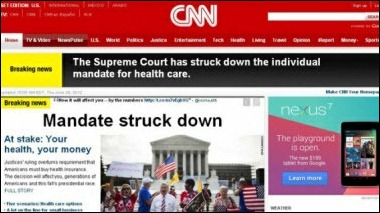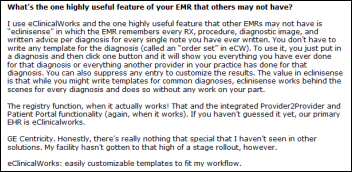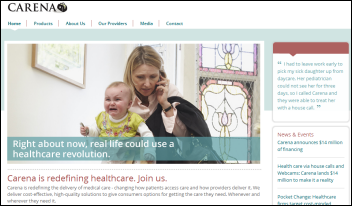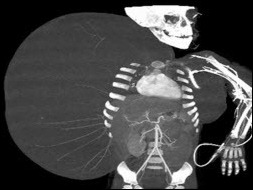Giving a patient medications in the ER, having them pop positive on a test, and then withholding further medications because…
News 6/29/12
Top News


A GAO report finds that the VA and DoD have made progress in their pilot project to integrate care at the James A. Lovell Federal Health Care Center (IL), but delays in implementing the IT component have resulted in additional costs. IT investments have already surpassed $122 million and some initiatives are almost two years behind schedule.
Reader Comments
 From Convener: “HIStalk’s announcement on the Supreme Court ruling. Once again you beat Modern Healthcare and all the others, and with a more comprehensive article.” Since Mr. H is busy traveling for his hospital job, we decided in advance that I would sit by computer and TV, listen for the announcement, and send readers a quick update. The moment MSNBC said the healthcare law had been upheld, I looked for an online write-up. Above is a screen shot of what CNN posted, which obviously left me mighty confused (obviously several so-called journalists hit the “post” button for their pre-written stories after reading only the first sentence of the ruling.) Thankfully I decided CNN simply had it wrong before I blast the news incorrectly to the HIStalk universe. Boy, Mr. H would have never let me live that down.
From Convener: “HIStalk’s announcement on the Supreme Court ruling. Once again you beat Modern Healthcare and all the others, and with a more comprehensive article.” Since Mr. H is busy traveling for his hospital job, we decided in advance that I would sit by computer and TV, listen for the announcement, and send readers a quick update. The moment MSNBC said the healthcare law had been upheld, I looked for an online write-up. Above is a screen shot of what CNN posted, which obviously left me mighty confused (obviously several so-called journalists hit the “post” button for their pre-written stories after reading only the first sentence of the ruling.) Thankfully I decided CNN simply had it wrong before I blast the news incorrectly to the HIStalk universe. Boy, Mr. H would have never let me live that down.
 From SummerFun: “HIStalk Practice Advisory Panel. I liked the write-up. Great questions and interesting answers.” In case you missed it, our first HIStalk Talk Practice Advisory Panel post was published earlier this week. The participants, who are primarily physicians and staff in ambulatory care practices, shared thoughts on their EMRs and discuss other technologies. It’s a fun read and a good mix of positive and negative impressions, just like real life.
From SummerFun: “HIStalk Practice Advisory Panel. I liked the write-up. Great questions and interesting answers.” In case you missed it, our first HIStalk Talk Practice Advisory Panel post was published earlier this week. The participants, who are primarily physicians and staff in ambulatory care practices, shared thoughts on their EMRs and discuss other technologies. It’s a fun read and a good mix of positive and negative impressions, just like real life.
From Blue Eyes: “Re: healthcare reform act. What do you think of the news and its effect on healthcare IT?” I think people have forgotten that Thursday’s ruling affirmed only the legality of creating the law, not to assess it as a good or bad idea. I’ve yet to hear anyone claim to have read and/or understood the 2,900 pages of legalese, including the politicians who voted for or against it, and it’s discouraging that even the Supremes voted pretty much along liberal / conservative lines (it’s either legal or it’s not, but you wouldn’t know that from the 5-4 opinion). I don’t know if anyone of us know what it means beyond lots of newly insured people showing up at the doors of hospitals and practices (at least when they can find a primary care provider to schedule them). I’d bet healthcare costs will continue to go up, healthcare IT will ramp up for another year or two until the Meaningful Use wad has been shot and providers go back to buying only what boosts their productivity or bottom line, and we’ll nonetheless start getting some highly useful big-picture data telling us where we stand from a population health perspective but leaving us to actually do something about it (like finding a way to get Americans to lose weight, exercise, and manage their expensive chronic conditions wisely and cost effectively). Here’s where the crowdsourcing thing works well: click the Comments link at the bottom of this post and tell me what you think. For those who have never commented, you don’t have to register first and you can give a phony name to stay anonymous. My general assessment when wearing my HIT tunnelvision goggles is that it’s a good thing. As a taxpayer, I’m not really sure.
From Watcher of the Skies: “Re: HCA. Going Epic. I was in training in Verona and someone from HCA in my class said so.” Unverified. HCA originally said they were doing a one-hospital Epic pilot to decide between it and upgrading Meditech, but nobody’s told me definitively which way they’re going.
From Robbie Douglas: “Re: McKesson. Close to making an acquisition of [company name removed], whose offerings include an ambulatory EHR and billing and management services.” I removed the company’s name since the rumor is unverified, but it sounds like a done deal. It’s a pretty big outfit.
From Cool Runnings: “Re: Drex DeFord. Leaving Seattle to take CIO position at Steward Health in MA. Steward’s for-profit 80-hour work weeks have taken their toll on a few CIOs in a short period of time. The CEO likes to call his leadership on weekends and expects them to work as many hours as he does.” Drex has updated his LinkedIn profile to list the Steward CIO job, so I’ll call that rumor verified. I worked for a for-profit hospital chain once for a short time. It was run by the biggest scumbags in the industry given my first-hand observation of their indifference to patient care and total worship of the bottom line. I wouldn’t care to repeat the experience, but to each his own.
HIStalk Announcements and Requests
Here’s some highlights from the last week on HIStalk Practice, in addition to the above-mentioned post from our Practice Advisory Panel: the biggest challenges of running a group practice. Alleviant announces plans to open a new facility in Vermillion, NC. The Office of the Inspector General finds that EMRs from Allscripts, eClinicalWorks, and GE Healthcare were products most widely used by physicians to document E/M services. Humana is the top payer among US health insurers in athenahealth’s Payerview Rankings. Aaron Berdofe discusses the federated model in the second part of his series on healthcare infrastructure data models. It takes so little to make me happy: a glass of nice wine, a new pair of strappy sandals, or a few new subscribers to HIStalk Practice. Make me merry, if you can. And thanks for reading.
On the Jobs Page: Software Engineering Manager, Project Manager, Web User Interface Design Engineer, Senior Buyer – Third Party Labor.
Listening: Lush, underrated alt rockers from England who had a 10-year run that ended in the late 1990s when their drummer killed himself. The music is rich, sweeping, and sweet, but rocking in a wistful sort of way (some place them in the “shoegazer” genre, but I’m not sure about that). I don’t know how I missed them, but it’s not too late since it still sounds fresh today. You’ll like it if you enjoy Cocteau Twins.
Everybody’s talking about voting of one kind or another these days, so here’s an urge to visit the (electronic) polls. Register to vote by signing up for e-mail updates. Cast your vote for progress by liking, friending, and connecting with the HIStalk party (Inga, Dr. Jayne, Dr. Travis, and me) via the social media ballot boxes. Send us your tired, you poor, and your rumors and news. Show your appreciation of our supporters by checking out the sponsor ads to your left and trying out the searchable, categorized Resource Center and Consulting RFI Blaster. As Alice Cooper says, I’m your top prime cut of meat, I’m your choice, I wanna be elected – as HIT’s go-to site for news, scandalous rumors, and occasionally irrelevant amusement. Thanks for your vote to keep me in (my upstairs spare bedroom) office for another bunch of years – I won’t let you down. I’m Mr. HIStalk and I approved this message.
Acquisitions, Funding, Business, and Stock
Practice Fusion secures an additional $34 million in Series C funding led by Artis Venture. The company has raised $64 million since it launched in 2007.
Carena, which offers webcam-based provider visits and other products, completes $14 million in financing led by Catholic Health Initiatives.
People
The Digital Pathology Association appoints Sharp HealthCare CIO Bill Spooner to its board.
Employee scheduling software vendor Avantas announces the promotion of Christopher Fox from SVP of growth and innovation to CEO and Jackie Larson from VP of client services to SVP. Fox takes over for founding CEO Lorane Kinney, who is retiring.
athenahealth appoints Charles D. Baker (General Catalyst Partners) and Jacqueline B. Kosecoff, PhD (Moriah Partners/Warburg Pincus)to its board.
Announcements and Implementations
Hoag Memorial Hospital Presbyterian (CA) implements Unibased’s ForSite 2020 RMS resource management and patient access solution across all of its diagnostic imaging locations.
The Pennsylvania eHealth Collaborative announces a grant program that gives providers a free year of DIRECT messaging services for secure health information exchange.
RiverView Health (MN) will go live on Epic July 1.
Ochsner Health System (LA) will go live on Epic this week ad its health center locations.
Government and Politics
Five senators introduce a bill that would create a national standard for notifying affected individuals about information security breaches. The bill, the fourth attempt to create national requirements, would also move enforcement to the Federal Trade Commission and allow that agency to levy fines of up to $500,000.
Other
The Bethlehem Area School District (PA) joins The Children’s Care Alliance, which maintains an EMR database of student health data supplied by school districts and made accessible to area hospitals.
Meditech President and CEO Howard Messing provides the opening remarks for the 11th Annual Pappalardo Fellowships in Physics Symposium at MIT, which is obviously supported by Neal Pappalardo of Meditech. Both are MIT alumni and physics fanboys. It’s a good talk.
Highline Medical Center and Franciscan Health System (WA) announce plans to explore a strategic affiliation, partly driven by Highline’s interest in using Franciscan’s Epic system that will go live next year.
University of Texas MD Anderson Cancer Center (TX) notifies patients that a computer containing patient and research information was stolen from a physician’s home April 30. The hospital says it will step up efforts to encrypt its computers, making you wonder how an organization as smart and rich as MDACC needed negative press to finally move the needle on encryption. Here’s a gentle nudge for their fellow fence-sitters: if you don’t encrypt your portable devices, you are being inexcusably irresponsible and deserve the inevitable headlines, CIO firing, and class action lawsuits that are likely to result when the “pay me now or pay me later” time bomb you allowed to be planted finally goes off. Everybody knows that healthcare IT is stuck in a 1980s time warp, but are we seriously still waffling on encrypting PHI-containing devices?
Meanwhile, the Alaska Department of Health and Social Services agrees to pay HHS $1.7 million to settle possible HIPAA violations stemming from the,theft of a USB hard drive from an employee’s car. The Office of Civil Rights determined that the Alaskan agency had inadequate security and risk controls in place and now must take corrective action to safeguard electronic PHI.
Is that a parachute in your backpack or are you just glad to see your surgeon? Mexican doctors remove a 33-pound tumor from the back of a two-year-old, 26-pound boy.
Sponsor Updates
- ICA announces that the Central Illinois HIE is live, with four up and running.
- Kony Solutions expands support of open standards with the release of its KonyOne Platform v5.0.
- Phoenix Children’s Hospital (AZ) chooses Access Intelligent Forms Suite to integrate data among its Allscripts HIS, electronic forms, and its MedPlus ChartMaxx content management application.
- Kareo releases a free iPhone app for accessing physician schedules online.
- Ingenious Med explains how its PQRS Registry is helping healthcare facilities to avoid penalties and improve revenue.
- Medicomp Systems CEO Dave Lareau discusses five EHR considerations for organizations preparing for ICD-10.
- Julie Corcoran, principal consultant with Hayes Management Consulting, highlights five of the major issues facing hospital revenue cycle teams.
- MyHealthDIRECT expands its partnership with Amerigroup to include Amerigroup’s Maryland provider partners and giving them access to MyHealthDIRECT’s online scheduling services.
- Wolters Kluwer Health announces that Essentia Health (MN) is the 1,000th customer to deploy its ProVation Medical software.
- BridgeHead Software releases the results of a survey finding that only 26% of worldwide HIT leaders have robust disaster recovery plans in place.
- Centracare Health System’s St. Cloud Hospital (MN) selects Merge PACS.
- New York eHealth Collaborative says it’s the first REC to hit 1,000 providers qualifying for Meaningful Use money.
EPtalk by Dr. Jayne
Like Inga and Mr. H, I sometimes become annoyed when my day job cuts into my HIStalk time. Unfortunately, this is one of those weeks. I had taken some time off this week to make sure I would be able to immediately respond to the much-anticipated Supreme Court decision, but it has been sucked up by a couple of hospital projects that have gone off the rails. I’ll definitely be responding to the decision, whatever it may be, but just not tonight.
HIStalk reader and contributor Micky Tripathi writes about “The Dangers of Too Much Ambition in Health Information Exchange.” He warns of over-architected HIEs that try to be all things to all people at the expense of short-term wins with real value. It’s a great piece that I hope obtains wide readership.
CMS will begin enforcing the use of version 5010 HIPAA transactions next week. Although it doesn’t seem there are continued widespread issues, anecdotal reports include ongoing tales of claims difficulties.
Physicians are subject to as many as 20 different varieties of payer audits. The American Medical Association has archived a webinar that covers the who, what, where, when, and why of auditing. Anyone who wonders about the high cost of health care and declining levels of provider satisfaction should take a peek.
No surprise: An online article in the Journal of the American Medical Association discusses the higher per-patient operating costs found in clinics with higher medical home scores. Medical homes can reduce overall health care spending, but there is little incentive to incur the upfront burden if the savings isn’t passed to those doing the work.
For Inga: a chocolatier says the Massachusetts pharmaceutical gift ban is hurting its business. Their popular corporate gift: chocolate shoes.
PremierConnect debuted this week, allowing providers and healthcare systems to access data from payers, claims, lab, billing, and other sources to monitor clinical performance and perform predictive modeling. The aggregated database includes data from more than 2,600 hospitals.
I was in Canada recently and heard quite a few public service announcements on the radio encouraging blood donors to step up and give. I haven’t heard much at home, but blood supplies in the US have reached “emergency levels,”according to the Red Cross. Summer heat and vacations typically limit donations and only 3% of people in America donate blood. If you’re looking for an air-conditioned place to spend some time over the upcoming holiday, consider taking a trip to your local blood bank. Chances are you’ll leave with a cookie and some orange juice in addition to knowing you may have just saved a life.
Contacts
Mr. H, Inga, Dr. Jayne, Dr. Gregg.
More news: HIStalk Practice, HIStalk Mobile.
















Not a traditional HISTalk post:
As many of you have heard, the wildfires in Colorado have been horrific. For Centura, we have several hundred people that had to evacuate their homes and an unknown number that lost their homes in the Waldo Canyon fire in Colorado Springs. Please consider donating to the Red Cross for the families and the firefighters who are fighting the wildfires in Colorado and the western United States. Thank you.
I haven’t read all 2,000 pages, but I’ve learned a great deal about ACA (aka ObamaCare) and it is, fundamentally, a law to make health insurance more affordable, more complete, and available to more Americans, all things many Americans need. It is not “putting the government between you and your doctor”… the reality is that payers are between you and your doctor (they decide what they will pay for (e.g., pre-cert) and what they won’t, and this won’t change). It is not the end of Freedom in America. It is increasing taxes on Americans that make over $250,000 (only on the portion of their income over $250K) — this affects me, I know, but I’ll pay it because this Act helps people I know, helps people I don’t know, and will help me to the extent it helps healthcare in America. The bulk of the rest of taxes collected are excise taxes paid by the medical device industry, pharma industry, etc., which they’re all willing to pay in return for more Americans with health insurance.
I know hundreds of HISTalk readers will now attack me…
Taken from an article today, “Obama defended the mandate in his remarks, saying in part that “when uninsured people who can afford coverage get sick and show up at the emergency room for care, the rest of us end up paying for their care in the form of higher premiums.”
How can the argument be made that our insurance premiums go up because of the uninsured ER visits? Sure, the hospital loses money; but, does POTUS seriously believe that big insurance feels sorry for the hospitals and then hits paying clients up with higher premiums? No way premiums should go up in correlation with unnecessary ER visits unless hospitals are up charging illegally on every “paying” patient to cover their losses. I think not. If a patient doesn’t have insurance, how could any carrier ever raise the premiums when there is certainly no reason for them to even know that a visit took place. Maybe I’ve missed something. I bet he meant to say our TAXES go up, not insurance premiums. Yeah, right.
Hellcare, the issue is that the ER is a lousy place to be getting ‘healthcare’. It’s a great setting for emergency care, but ideally individuals have PCPs, get seen regularly, get advised on their health, have their chronic conditions managed, get screenings, and other ‘healthcare’ services. When individuals don’t get this, they end up with more severe medical issues (e.g., diabetes, hypertension, etc.), end up needing more expensive services on an emergent basis, and end up with big charges they never pay. These costs get absorbed by other, paying customers, which are insurance companies (and employers), which then pass them on as premiums to their customers.
If more individuals had insurance, they would get more healthcare in a lower cost setting than ERs, would be healthier (on the whole), and the medical cost curve might bend, even if just a little. A little bend in the curve would be very valuable for the U.S. as a whole, on so many levels.
Hellcare, you genuinely misunderstand the entire problem.
You write, “How can the argument be made that our insurance premiums go up because of the uninsured ER visits? Sure, the hospital loses money; but, does POTUS seriously believe that big insurance feels sorry for the hospitals and then hits paying clients up with higher premiums? No way premiums should go up in correlation with unnecessary ER visits unless hospitals are up charging illegally on every “paying” patient to cover their losses.”
This is pure economics 101. The underlying “cost” of that ER visit is not simply swallowed by the hospital any more than a retail store swallows the cost of shoplifters — not really comparing the uninsured to shoplifters, just the costs. Those costs are passed along to everyone else. For insured people, that means insurance companies pay more. When insurance companies pay more, your premiums are sure to follow.
It might seem like a nominal amount. But, ER-based primary care is just about the most inefficient, inequitable, and expensive manner of delivering primary care.
Moreover, I don’t understand what “charging illegally” means. Is there some law that would prevent a private enterprise from charging “customers” what the market will bear — ignoring medicare/medicaid, of course. Do you reject how the market works?
RE: ” I’d bet healthcare costs will continue to go up, ”
Boy, do you got that right. After 35 yrs in this HIT world I have yet to see ANY capital investment (equipment, structures, software, infrastructures, etc.) really stop the increase in health care costs, let alone reduce it. Improve quality – yes, reduce costs – no.
We the people seem to have an insatiable appetite for health care and there seems to be no way to control or cap it.
Its shocking to see the minimal understanding of ACA on an HIT blog….
Shocking, but it explains a lot.
“…it’s discouraging that even the Supremes voted pretty much along liberal / conservative lines (it’s either legal or it’s not, but you wouldn’t know that from the 5-4 opinion).”
I absolutely agree. I wouldn’t necessarily expect complete unanimity, but if justices are supposed to be impartial then why are so many controversial rulings 5-4? It gives the appearance that they’re just as swayed by personal sentiment as the average Joe.
Personally, taking on the Right is just a matter of reframing the argument.
One way to view what this law does is makes it clear that responsible people in society will not simply foot the bill for the irresponsible (i.e., those without insurance). And that while our society values life over money/property (ERs will treat you), you do not get to reap the benefit of other people being responsible without some penalty (now “tax”).
I think that the folks that oppose the ACA don’t understand that we are already paying for the uninsured, but that we’re doing it in a very, very expensive, inefficient manner.
Re: MD Anderson – 900 people doing IT there and no attention to data encryption?
Just look at the leadership…
Mike – perhaps I didn’t clarify as well as I could have – and I’ll admit that I might still be wrong. First off, I’m all for Capitalism and how the market responds to supply and demand. What I don’t understand (and it could be because I’ve never worked in the hospital setting) is if the hospitals are bound by fee schedules like ambulatory providers are; they could increase their fees all day long; but, not receive any more in reimbursement than what the insurance companies define as reasonable and customary, right? Or if I’m wrong – therein lies part of my incorrect assumptions. As I said, I’m familiar with the ambulatory side of healthcare reimbursement; but, not hospital contractual reimbursement. Also, I didn’t mean to imply that any hospital is boosting their losses by doing anything illegal – in fact the opposite. As I stated earlier, “I think not”.
I’m not sure that I believe the insurance companies are sympathetic enough to pay more to the hospitals to ease their losses even though hospitals have better fee negotiation skills than individual practitioners struggling to see their patients and put a meal on their own table. I really believe that in the entire healthcare debacle – these big insurance companies have caused a huge amount of the damage to our system by limiting a providers reimbursement to what they feel he/she should be paid. Where is free enterprise there? Well, the doctors could have opted out of the plans; but, many feared hospital reprisal as well as patients going to providers that were willing to take less. Most of the doctors I speak with really don’t like insurance companies.
Depressed in NE – I also agree that the ER is not the place for treatment; but, has become that because of lack of insurance coverage. Your comments make sense about proper treatment preventing more dangerous and expensive to treat diseases.
Finally, I am very sympathetic to those that cannot afford or qualify for health insurance. I’ve been one before – due to Cobra costing more than I could afford. It’s not that I am opposed to the concept behind the ACA, because I would like to see everyone have access to good healthcare; but, I just don’t see anything but political maneuvering behind this. However, it’s so hot that perhaps my brain is fried this week!
PS. Don’t assume I was a blight on society when I mentioned having been in an uninsured’s shoes. Again, I should proof better! Before giving in to Cobra robbery, I found that I could get a short-term healthcare policy equivalent to a high deductible plan where 3 months of premiums were equal to 1 month of cobra. I also found that providers offered lower prices to cash patients and I learned to shop more carefully for meds. Costco and yes, coupons online for certain meds left me with the ability to simply purchase the short term major medical policy in case I needed a trip to the hospital – which, fortunately, I did not have to do!
I think this is a key question to consider regarding ACA. There are several different ways to achieve universal access to healthcare. One is government-centric – either as total provider, like the NHS in the UK, or as a single payer like Canada. Another is mixed – the provision, and most payors are private, but the safety net insurance plan is provided by the government – AFAIK this is the current system in Germany. A third way is all private insurance, and private providers, in a highly regulated marketplace (which includes individual insurance mandate), like in Switzerland.
There are variations on the above, but IMO not significant. As the hearings on how to move towards universal healthcare access began, the first model was not even considered, despite some significant support from medical professionals. The second model, known as the “public option” was sacrificed in order to get enough support to allow for a vote on the bill.
I believe, that the if implemented successfully, ACA will eventually resemble the Swiss private model. It will be cheaper, but not much cheaper (the Swiss pay the second-highest medical costs per capita, I think), and it is not a guarantee that implementation will be successful, but I think there is really no way to invent something that has not already been found to work in other places. For better or for worse, a highly regulated marketplace is what seems to be the future of healthcare in the US.